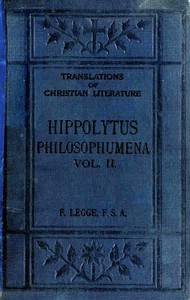Philosophumena; or, The refutation of all heresies, Volume II by Hippolytus
"Philosophumena; or, The Refutation of All Heresies, Volume II" by Hippolytus is a theological and philosophical work written in the early 3rd century. This text seeks to counter various heretical beliefs within early Christianity, particularly those attributed to figures like Simon Magus and Valentinus. It outlines the doctrines and teachings of these heresies, dissecting their implications and how they diverge from orthodox Christian beliefs. The opening of the work introduces the focus
on Simon Magus and his followers, highlighting his magical practices and claims of divinity. It contrasts Simon's doctrines with those of other heretics, revealing their reliance on Platonic and Pythagorean philosophies rather than scripture. The text describes Simon’s attempts to establish himself as a deity and includes anecdotes illustrating the deceptions he employed. Hippolytus also introduces Valentinus as a key figure with heretical beliefs, noting how his teachings draw on earlier Greek philosophical concepts to shape his ideas about the divine. The beginning effectively sets the tone for a rigorous critique of divergent theological views, presenting a foundational understanding of early Christian orthodoxy versus heretical thought. (This is an automatically generated summary.)
Read or download for free
| How to read | Url | Size | |||
|---|---|---|---|---|---|
| Read now! | https://www.gutenberg.org/ebooks/67116.html.images | 804 kB | |||
| EPUB3 (E-readers incl. Send-to-Kindle) | https://www.gutenberg.org/ebooks/67116.epub3.images | 490 kB | |||
| EPUB (older E-readers) | https://www.gutenberg.org/ebooks/67116.epub.images | 500 kB | |||
| EPUB (no images, older E-readers) | https://www.gutenberg.org/ebooks/67116.epub.noimages | 477 kB | |||
| Kindle | https://www.gutenberg.org/ebooks/67116.kf8.images | 1.3 MB | |||
| older Kindles | https://www.gutenberg.org/ebooks/67116.kindle.images | 1.3 MB | |||
| Plain Text UTF-8 | https://www.gutenberg.org/ebooks/67116.txt.utf-8 | 516 kB | |||
| Download HTML (zip) | https://www.gutenberg.org/cache/epub/67116/pg67116-h.zip | 478 kB | |||
| There may be more files related to this item. | |||||
Similar Books
About this eBook
| Author | Hippolytus, Antipope, 170?-236? |
|---|---|
| Dubious author | Origen, 185?-254? |
| Translator | Legge, Francis, 1853-1922 |
| Title | Philosophumena; or, The refutation of all heresies, Volume II |
| Original Publication | United Kingdom: The Macmillan Co.,1921. |
| Series Title | Translations of Christian literature. Series I. Greek texts |
| Note | Reading ease score: 70.9 (7th grade). Fairly easy to read. |
| Note | "Formerly attributed to Origen, but now to Hippolytus[...]" |
| Note | Wikipedia page about this book: https://en.wikipedia.org/wiki/Refutation_of_All_Heresies |
| Contents | Book VI. Simon Magus, Valentinus, and their followers -- Book VII. Basilides, Saturnilus, and others -- Book VIII. The docetae, Monoimus, and others -- Book IX. Noetus, Callistus, and others -- Book X. Summaries, and the word of truth. |
| Credits | Wouter Franssen and the Online Distributed Proofreading Team at https://www.pgdp.net (This file was produced from images generously made available by The Internet Archive/Canadian Libraries) |
| Language | English |
| LoC Class | BR: Philosophy, Psychology, Religion: Christianity |
| Subject | Occultism |
| Subject | Philosophy, Ancient |
| Subject | Christian heresies -- History -- Early church, ca. 30-600 |
| Category | Text |
| EBook-No. | 67116 |
| Release Date | Jan 7, 2022 |
| Copyright Status | Public domain in the USA. |
| Downloads | 209 downloads in the last 30 days. |
| Project Gutenberg eBooks are always free! | |

